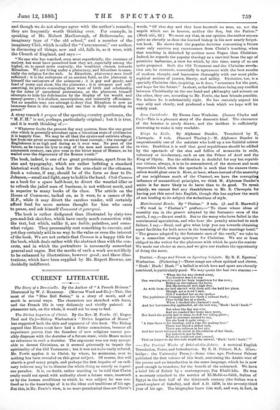The Divine Legation of Christ. By the Rev. If. Fowle.
(C. Kegan Paul and Co.)—Bishop Warburton's "Divine Legation of Moses" has suggested both the title and argument of this book. The Bishop argued that Moses must have had a divine commission, because all experience proves that the founders of new religions cannot pos- sibly dispense with the doctrine of a future state, while Moses makes no reference to such a doctrine. The argument was not very accept- able to devout Christians, as it seemed grievously to impair the spirituality of the Old Testament ; but it was not Lobe easily refuted. Mr. Fowle applies it to Christ, by whom, he maintains, next to nothing has been revealed on this great subject. Of coarse, this will startle a good many people, and perhaps the first impulse of an ordi- nary believer may be to dismiss the whole thing as merely an ingeni- ous paradox. It is, no doubt, rather startling to be told that Christ really could not speak with authority about a future state, inasmuch as by the human conditions to which he was subject he was con- fined as to the knowledge of it to the ideas and traditions of his age. But this, in Mr. Fowle's view, is no more paradoxical than are Christ's
words, "Of that day and that hour knoweth no man, no, not the angels which are in heaven, neither the Son, but the Father." (Mark xiii., 32.) We must say that in our opinion, the author argues quite as cleverly as does the learned bishop in his now nearly forgot- ten book. He shows that the popular doctrine concerning a future state only receives any countenance from Christ's teaching, when that teaching is distorted by notions more Pagan than Christian. Indeed, he regards the popular theology as a survival from the ago of primitive barbarism, a view for which, by this time, many of us are quite prepared. Both the Old Testament and the Christian revela- tion are, he contends, essentially in agreement with the best results of modern thought, and harmonise thoroughly with our most philo- sophical notions of justice, liberty, and utility. Evolution, too, is a specially Christian idea, inspiring, as it does, "reverence for the past, and hope for tho future." In short, so far from there being any conflict between Christianity on the one hand and philosophy and science on the other, they are, according to Mr. Fowle, the best friends possible. We believe he is substantially right. He has certainly argued his case ably and clearly, and produced a book which we hope will be widely read.


































 Previous page
Previous page